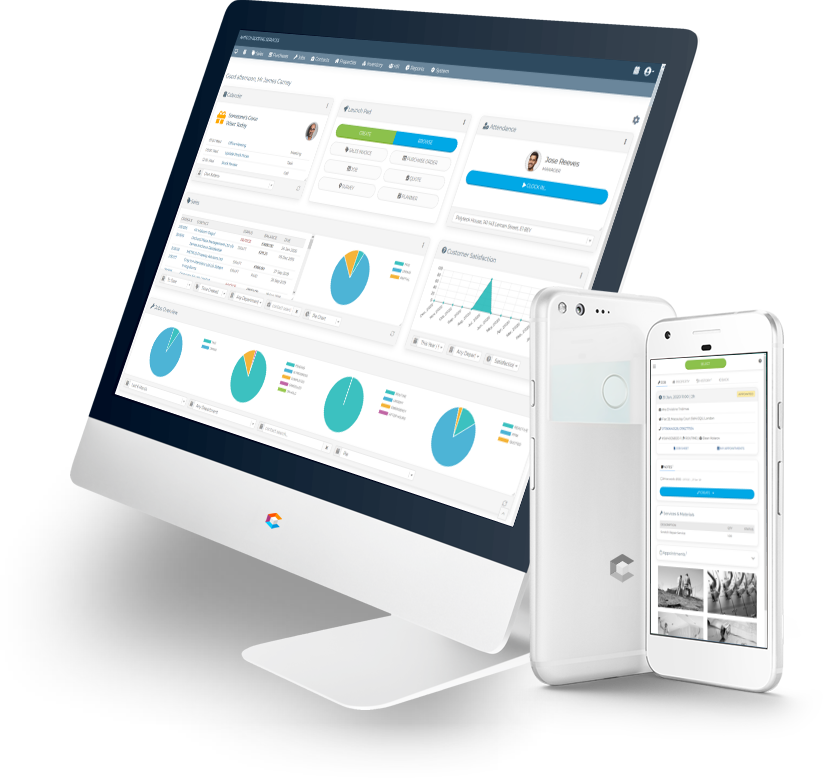Electrical Services
Schedule, Invoice & Manage Your Electrical Services, Stocks and Assets with Our Advance ERP Software
Enhancing Electrical Service Businesses with ERP Software
In today's rapidly evolving technological landscape, businesses in the electrical services sector face increasing pressure to streamline operations, enhance efficiency, and deliver superior customer service. Enterprise Resource Planning (ERP) software has emerged as a pivotal tool in achieving these objectives. For electrical service companies, implementing ERP software can be a game-changer, transforming their operational capabilities and driving significant improvements in productivity and profitability.
What is Nettware ?
Nettware is an integrated suite of applications designed to manage and automate various business processes. It centralizes data from different departments, providing a unified view of operations. Key functions of ERP systems include inventory management, finance and accounting, human resources, customer relationship management (CRM), and project management. By consolidating these functions, ERP software eliminates data silos, reduces manual work, and ensures that all parts of the organization are aligned and working efficiently.
Key Benefits of ERP Software for Electrical Service Businesses
Streamlined Operations: ERP software integrates various business processes into a single system, allowing electrical service companies to manage their operations more efficiently. From project management to inventory control, all functions are seamlessly interconnected, reducing redundancies and ensuring smoother workflows.
Enhanced Project Management: Electrical service businesses often handle multiple projects simultaneously. ERP software provides comprehensive project management tools, enabling firms to plan, execute, and monitor projects more effectively. Features such as Gantt charts, task assignments, and real-time progress tracking ensure that projects are completed on time and within budget.
Improved Inventory Management: Managing inventory is crucial for electrical service providers who need to maintain a steady supply of parts and equipment. ERP systems offer advanced inventory management capabilities, including real-time tracking, automated reordering, and optimized stock levels. This ensures that the right materials are always available when needed, minimizing downtime and enhancing service delivery.
Accurate Financial Management: ERP software integrates financial data across all business functions, providing a clear and accurate view of the company's financial health. This includes accounts payable and receivable, payroll, budgeting, and financial reporting. With real-time financial insights, electrical service businesses can make informed decisions, manage cash flow more effectively, and ensure regulatory compliance.
Enhanced Customer Relationship Management (CRM): Maintaining strong customer relationships is vital for the success of any service-oriented business. ERP systems include robust CRM modules that help manage customer interactions, track service history, and facilitate communication. This leads to improved customer satisfaction and loyalty, as businesses can respond more quickly to customer needs and deliver personalized service.
Optimized Human Resources Management: ERP software streamlines HR processes, from recruitment and onboarding to performance management and payroll. For electrical service businesses, this means more efficient workforce management, better talent retention, and improved employee satisfaction.
Data-Driven Decision Making: One of the most significant advantages of ERP software is its ability to provide real-time data and analytics. Electrical service businesses can leverage this data to gain insights into operational performance, identify trends, and make data-driven decisions. This proactive approach helps in optimizing resources, reducing costs, and improving overall business performance.
Choose the Right Software Solution
When selecting an ERP solution for an electrical service business, it is essential to consider several factors:
Scalability: The ERP system should be scalable to accommodate business growth and evolving needs.
Industry-Specific Features: Look for ERP solutions that offer features tailored to the electrical services industry, such as project management tools, inventory management for electrical components, and compliance tracking.
User-Friendly Interface: The system should be intuitive and easy to use, ensuring that employees can quickly adapt and utilize its features effectively.
Integration Capabilities: Ensure that the ERP software can integrate seamlessly with existing systems and third-party applications.
Vendor Support: Choose a reputable vendor that offers robust customer support, regular updates, and training resources.
For electrical service businesses, implementing ERP software is a strategic investment that can drive operational excellence and business growth. By centralizing and automating key processes, ERP systems enhance efficiency, improve project management, and provide valuable insights that inform decision-making. As the electrical services industry continues to evolve, leveraging ERP technology will be crucial in staying competitive and delivering exceptional service to customers.

